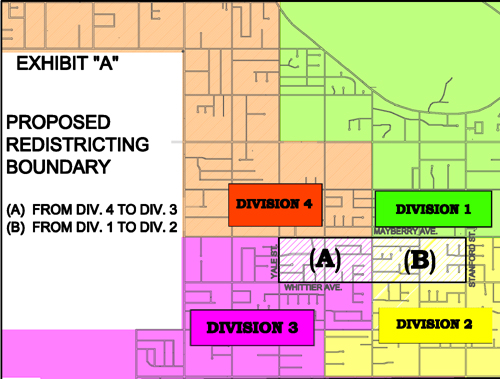Modifies directors' districts' boundaries

The Lake Hemet Municipal Water District (LHMWD) board of Directors heard from the contractor for the district’s Lake Hemet facility and enacted two resolutions at its latest meeting.
Lake Hemet Campground
Earlier this year, the district contracted with The California Parks Company (TCPC) to mange the Lake Hemet Campground.
At the Nov. 17, meeting, Marshall Pike, Vice President, Communications and Business Development for TCPC, discussed with the board the company’s accomplishments during its first season.
TCPC has revamped all the long-term rental policies and created the first Tenant Services Department. Rate increases have resulted in decreased occupancy, which the company hopes to change during the winter and next year. Its marketing plan addresses the goal of adding 50 month-to-month tenants.
With the new rates came improved services Pike explained. This included maintenance of a site for absentee owners, preparation for winter, site cleaning and the construction of a new gate to control access when an attendant is not available.
“The next project is WiFi and in the spring we’ll rehabilitate the shower house,” Pike said. Recently, TCPC has begun marketing the sales of recreation vehicles in some of the long-term sites. These can be viewed on the Lake Hemet campground site.
The new card gate allows tenants to enter the campground after the kiosk is closed. The gate will also accept cash and credit cards allowing fee entrance to late arrivals.
The company has also improved marketing to groups. Pike said Good Sam’s Clubs was one example of the groups to which they are reaching out.
During the second quarter (July 1 through Sept. 30), TCPC collected more than $800,000 in revenue and generated net income of about $66,700. It kept usage at about the 2010 level and expects it to increase next year.
Before concluding, Pike requested the board consider two new ordinances for campground management. First he asked for permission to allow touring motorcycles into several campsites in Area 1, where they would be permitted to drive to the site but not within the campground.
Secondly he sought to allow the use of sit-on-top kayaks and canoes at the lake. They would be rented by camp management. Users would be required to wear life vests at all times and remain in Marina Cove or within a buoyed area. Both of these proposed ordinances will be on future district agendas.
Redistricting
Even for a special district the size of LHMWD, the 2010 census creates redistricting issues. The five members of the district’s board are elected from individual districts rather than at large.
At the Nov. 17 meeting, the board approved a resolution containing staff recommendations to adjust four of the five districts to accommodate the 2010 population figures.
Based on released census data, the size of LHMWD’s districts ranged from 85 percent to 110 percent of the average. Federal law encourages the variation to be less than 10 percent.
The recommendation was to shift an area with 865 people from District 4 to 3 and another area of 987 people from District 1 to District 2. District 5, which is Valle Vista and Garner Valley, would not change.
These adjustments would limit the districts’ sizes to 95 percent to 104 percent of the average.
Budget
Although the district’s finances were not discussed, the board did approve a resolution establishing an early retirement program.
LHMWD is offering to pay into CalPERS two years of service or a one-time $30,000 payment directly to the employee for early retirment.
By Dec. 1, eligible employees must be 55 years old, have 10 years of continuous service with LHMWD, give notice to retire by Dec. 31, 2011, and actually begin the CalPERS retirement before April 1, 2012. Employees who retired before Dec. 1 are not eligible for the benefits.
“The last time we provided incentives for early retirement was 2004,” General Manager Tom Wagoner told the board. Based on preliminary discussions, Wagoner believes five employees would avail possibly themselves of the opportunity.
“It’s a significant savings of more than $1 million over seven years” said President Frank Gorman. “We lose a lot of experience, but there are people who can fill in.”
The board approved the resolution unanimously.










